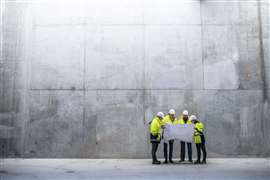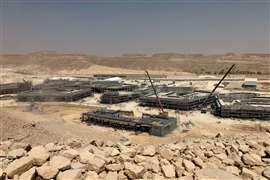EC prepares for ‘third industrial revolution’
12 June 2012

A decision by the European Commission (EC) to establish a high level working group with members of the construction industry as part of an action plan for the industry has been welcomed by FIEC (the European Construction Industry Federation).
Details of the action plan were revealed by EC vice president Antonio Tajani at FIEC's annual congress in Istanbul, Turkey. He said that the world was on the verge of a third industrial revolution.
He told the congress that the performance of the construction sector had a significant bearing on the development of the overall economy.
"The competitiveness of construction companies is therefore an important issue not only for growth and employment in general, but also to ensure the sustainability of the sector," he said, adding that the construction sector was strategic for growth within the EU 2020 strategy agenda.
He said a strong European Commission and European Parliament would have to implement the action plan to reach the 2020 targets.
"The action plan is not going to be a simple expression of goodwill - it must translate into concrete results," said Mr Tajani. He added that there needed to be a focus on growth with continued permanent dialogue.
The outgoing FIEC president, Luisa Todini, welcomed the decision to hold more regular high level summits between FIEC and the EC, adding, "We will do all we can to ensure that the proposed policies and recommendations will translate into useful instruments for sustainable and competitive growth on the ground."
Mr Tajani told the congress that sustainability was one of the key issues. He said, "Buildings need to be constructed on a more sustainable basis, so contractors need to be up-to-date."
He also said that 80% of current building stock needed to be reclassified for energy. "We are lagging behind, and must come up with solutions."
Competition
Competition was another area addressed by Mr Tajani, particularly with regard to public tenders. He said there was unfair competition and that it was a very challenging situation.
"It is difficult to tender in non-EU countries. We are working really hard on this, and want the rules of the game to be determined - but with the competition, it feels like a game of ten playing a team of 13."
He said his recommendation was to have a European strategy directly related to the industry in place before the EC broke up for the summer recess.
Mr Tajani outlined a number of objectives to strengthen investment to improve and increase competitiveness. He said the maintenance of infrastructure and the reduction of energy consumption were priorities.
Another part of the action plan is to improve the qualifications of workers. He called for the education of the younger generation to provide a trained workforce, and to do away with young workforce migration.
"We realise current investment is not sufficient," he said, adding that current levels of research and development in the industry meant that many projects would not be completed, which could open the door to Chinese companies.
He said that moving towads a new industrial revolution, an action plan was being discussed.
"We can only win against China with quality," he said. "Europe is going through a transformation at the moment, and must adjust to the needs of that transformation."
He said, "We need to overcome bureaucratic obstacles. We need to focus on growth. We need to keep up a permanent dialogue and we welcome federations to have active participation. To strengthen the industry and the economy, we need to get growth to start."
He added that the action plan would be announced in a few months.
Luisa Todini said, "There is much potential linked to the renovation of existing buildings, renewable and sustainable transport and energy infrastructure, but very often financing is lacking and the regulatory framework does not encourage a long-term investment perspective."
She added, "Many of our companies, mainly SMEs (small- and medium-sized enterprises), are being forced into bankruptcy through continued late payment by public authorities and through the refusal of banks to lend."
Ms Todini said that to ensure the competitiveness of EU companies, it was crucial to have a level playing field in compliance with environmental, social and corporate governance standards on European and international markets.
STAY CONNECTED



Receive the information you need when you need it through our world-leading magazines, newsletters and daily briefings.
CONNECT WITH THE TEAM










